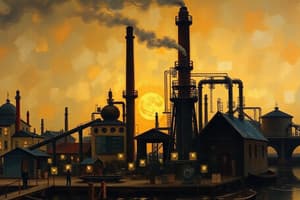Podcast
Questions and Answers
What is petroleum primarily composed of?
What is petroleum primarily composed of?
- Coal and shale
- Metals and gases
- Organic compounds and hydrocarbons (correct)
- Water and minerals
Crude oil and natural gas have the same composition.
Crude oil and natural gas have the same composition.
False (B)
What is natural gas condensate?
What is natural gas condensate?
A substance that forms when heavier hydrocarbons in natural gas condense at the surface.
Petroleum is traditionally classified as crude oil and _____ gas.
Petroleum is traditionally classified as crude oil and _____ gas.
Match the following types of hydrocarbons with their state at surface conditions:
Match the following types of hydrocarbons with their state at surface conditions:
What does the term 'associated gas' refer to?
What does the term 'associated gas' refer to?
Heavier hydrocarbons can exist as gases under all conditions.
Heavier hydrocarbons can exist as gases under all conditions.
What is the primary reason that the prosperity of a country is tied to its petroleum reserves?
What is the primary reason that the prosperity of a country is tied to its petroleum reserves?
Flashcards
Petroleum
Petroleum
Crude oil, occurring beneath the Earth's crust, often trapped in rocks.
Crude Oil Composition
Crude Oil Composition
A mixture of about 150 organic compounds (mostly hydrocarbons, some aromatics and sulfur/nitrogen).
Lighter Hydrocarbons
Lighter Hydrocarbons
Hydrocarbons like methane, ethane, propane, and butane, typically gaseous at surface conditions.
Heavier Hydrocarbons
Heavier Hydrocarbons
Signup and view all the flashcards
Natural Gas
Natural Gas
Signup and view all the flashcards
Oil Well Production
Oil Well Production
Signup and view all the flashcards
Associated Gas
Associated Gas
Signup and view all the flashcards
Natural Gas Condensate
Natural Gas Condensate
Signup and view all the flashcards
Study Notes
Petroleum Chemistry
- Petroleum, also known as crude oil, is found trapped in rocks beneath the Earth's surface.
- It's extracted by drilling wells to reach oil reserves.
- Crude oil is a dark brown, viscous liquid, sometimes greenish.
- It's a mixture of about 150 different organic compounds, mostly aliphatic hydrocarbons.
- It also contains aromatic compounds and sulfur/nitrogen compounds.
- Petroleum's importance is crucial for transportation, commerce, and industry.
- A country's prosperity relies on its petroleum reserves.
Petroleum Composition
- Petroleum, in its strict sense relates only to crude oil. But in common usage, it includes both crude oil and natural gas.
- Petroleum is predominantly a mixture of hydrocarbons.
- Lighter hydrocarbons (methane, ethane, propane, butane) exist as gases under surface conditions; heavier hydrocarbons (pentane onward) are liquid or solid.
- The proportion of gas to liquid changes depending on subsurface conditions and the phase diagram of the petroleum mixture.
- Oil wells usually produce crude oil alongside dissolved natural gas (some of which escapes at the surface).
- Gas wells mostly produce natural gas.
- Underground reservoir conditions cause high pressures and temperatures.
- These conditions result in heavier gas components like pentane, hexane, and heptane remaining gaseous.
- Under surface conditions, these components condense into a liquid form, known as natural gas condensate (often simply referred to as condensate).
- Condensates are similar in composition and appearance to volatile, light crude oils.
Composition Variation
- The proportion of hydrocarbons in crude oil varies significantly across different oil fields.
- Lighter oils contain up to 97% hydrocarbons by weight.
- Heavier oils and bitumens contain as little as 50%.
Studying That Suits You
Use AI to generate personalized quizzes and flashcards to suit your learning preferences.




